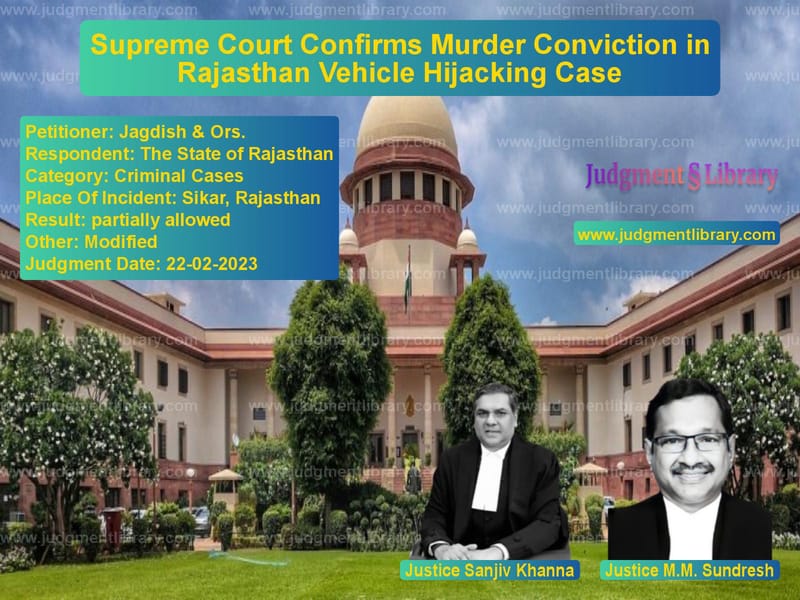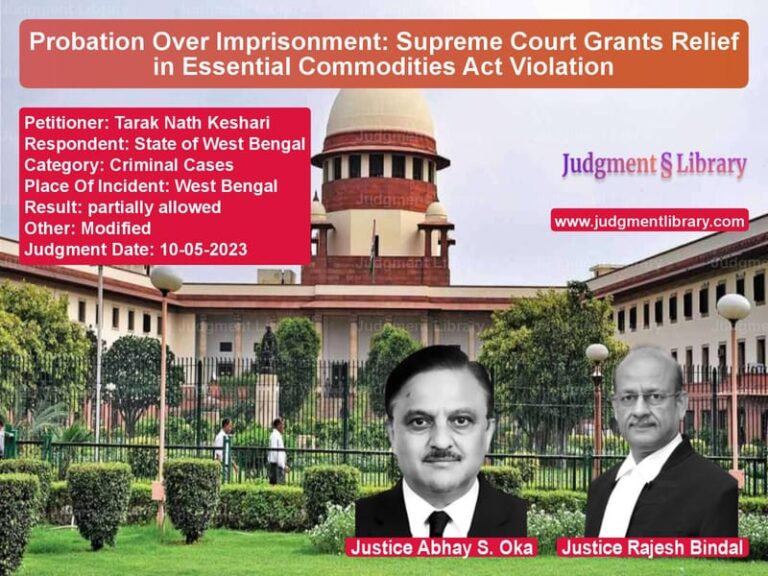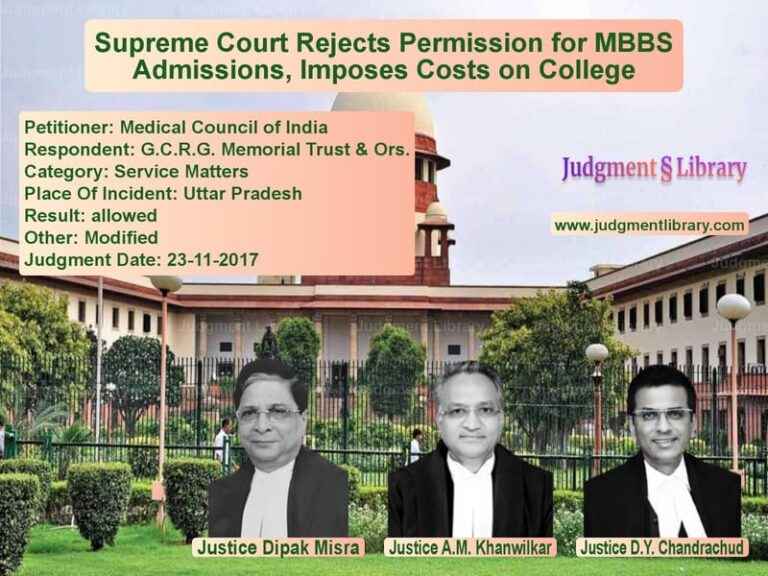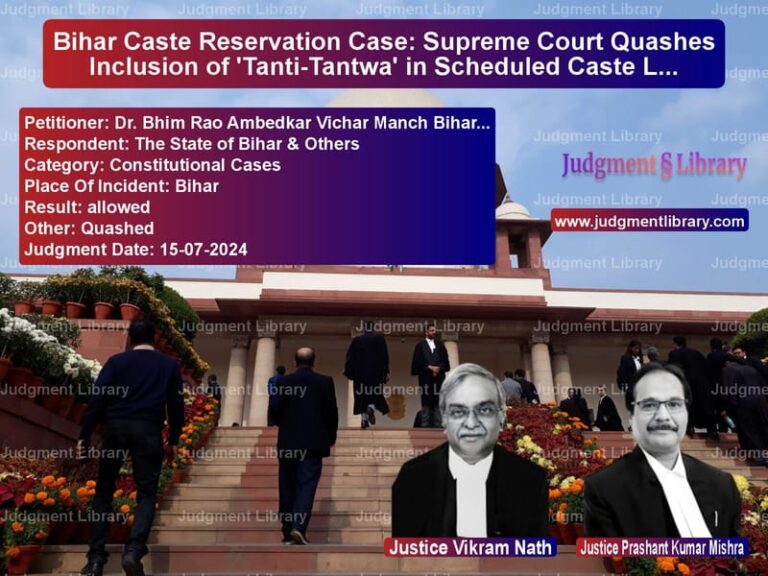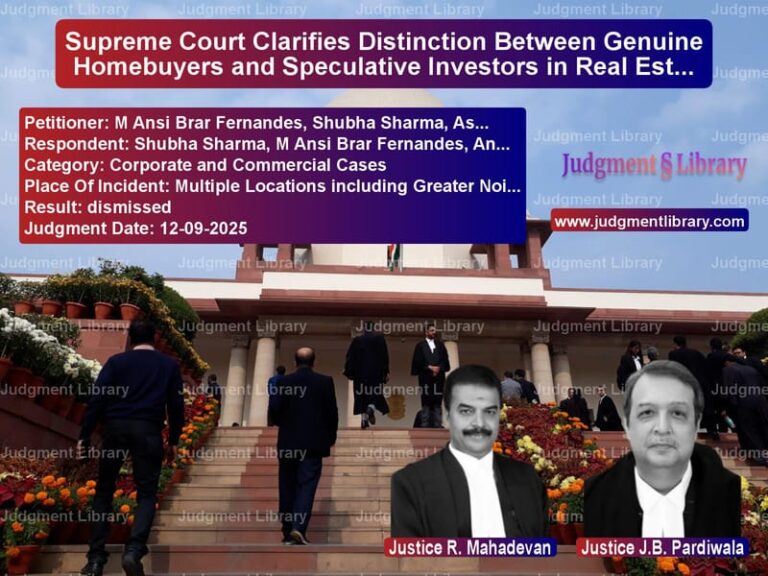Supreme Court Confirms Murder Conviction in Rajasthan Vehicle Hijacking Case
The Supreme Court of India recently ruled in the case of Jagdish & Ors. vs. The State of Rajasthan, concerning a brutal murder linked to vehicle hijacking. The Court upheld the convictions of two of the accused while acquitting a third due to lack of evidence. The ruling clarifies the application of circumstantial evidence, identification by witnesses, and the benefit of the doubt in criminal trials.
Background of the Case
The case originated from an incident on March 5, 2009, in Sikar district, Rajasthan. The victim, Ram Chandra, a Bolero vehicle owner, was last seen at the local bus stand interacting with three to four people who sought to hire his vehicle to travel to Kuchaman. He never returned home that night.
The next day, his cousin, Shiv Bhagwan, filed a missing complaint at the police station. Shortly thereafter, police intercepted Ram Chandra’s Bolero, finding bloodstains and bloodied clothes inside. The occupants of the vehicle attempted to flee, but two of them, Jagdish and Prakash, were apprehended. Based on their confessional statements, the police discovered Ram Chandra’s dead body in a well near Rajpura bus stand. The third accused, Bablu, was arrested over a year later, in May 2010, based on further investigation.
Legal Issues Before the Supreme Court
- Whether the prosecution had sufficient evidence to establish the guilt of the accused beyond reasonable doubt.
- Whether the testimonies of witnesses and circumstantial evidence were reliable.
- Whether the third accused, Bablu, was involved in the crime, given the lack of direct evidence against him.
Prosecution’s Arguments
The prosecution contended:
“The accused were last seen with the victim before he disappeared. Their confessions led to the discovery of the dead body, and forensic evidence from the seized vehicle confirmed the presence of the victim’s blood.”
The prosecution relied on the following key pieces of evidence:
- Testimony of Shiv Bhagwan (PW-1), who identified the accused as the last people seen with the victim.
- Police officers Constable Mani Ram (PW-6) and Head Constable Rekharam (PW-9), who testified that they intercepted the stolen vehicle and caught the accused attempting to escape.
- Forensic evidence confirming that the blood found in the vehicle matched that of the victim.
- The confessional statements of the accused, leading to the recovery of the victim’s body.
Defense Arguments
The defense argued:
“The prosecution has failed to establish a direct link between the accused and the murder. Mere presence near the victim does not amount to proof of guilt.”
For Bablu, the defense specifically contended:
- He was arrested over a year after the crime, with no direct evidence linking him to the incident.
- His identification in a test parade occurred 13 months after the event, which raised doubts about the reliability of witness recollection.
- The police did not produce any corroborative evidence, such as call records or CCTV footage, proving his involvement.
Supreme Court’s Observations
The Supreme Court examined the case in detail and made several key observations:
- The prosecution had successfully established a direct link between Jagdish and Prakash and the crime, based on their arrest in the stolen vehicle, their confessional statements, and witness testimonies.
- The last seen theory applied strongly in this case, as the accused were the last people seen with the victim before his disappearance.
- For Bablu, however, the Court found insufficient evidence. The test identification parade was conducted too late, and no reliable forensic or corroborative evidence placed him at the crime scene.
The Court concluded that while the case against Jagdish and Prakash was airtight, the same could not be said for Bablu.
Final Judgment
The Supreme Court delivered the following verdict:
- Jagdish and Prakash – Convicted under Section 302 read with Section 34 IPC (murder with common intent) and sentenced to life imprisonment. However, their conviction under Section 397 (robbery with deadly force) was reduced to Section 392 (robbery), resulting in a five-year imprisonment term.
- Bablu – Acquitted due to lack of sufficient evidence. The Court ordered his immediate release unless he was required to be detained in another case.
Implications of the Judgment
The ruling clarifies important legal principles:
- Last Seen Theory: When an accused is the last person seen with the deceased, they must provide a reasonable explanation for the subsequent events.
- Burden of Proof: While circumstantial evidence can be sufficient for conviction, each link in the chain must be proven beyond reasonable doubt.
- Test Identification Parade: Witness identifications conducted long after the event can be unreliable, especially when uncorroborated by other evidence.
- Benefit of Doubt: When evidence is insufficient, the accused must be acquitted, even if there are suspicions about their involvement.
Conclusion
This judgment reinforces the importance of thorough investigation and fair trials. While Jagdish and Prakash’s conviction highlights the effectiveness of circumstantial evidence, Bablu’s acquittal demonstrates the Court’s commitment to the principle that no person should be convicted on weak or speculative evidence.
Read also: https://judgmentlibrary.com/supreme-court-ruling-on-dowry-death-case-understanding-section-319-crpc/
Petitioner Name: Jagdish & Ors..Respondent Name: The State of Rajasthan.Judgment By: Justice Sanjiv Khanna, Justice M.M. Sundresh.Place Of Incident: Sikar, Rajasthan.Judgment Date: 22-02-2023.
Don’t miss out on the full details! Download the complete judgment in PDF format below and gain valuable insights instantly!
Download Judgment: jagdish-&-ors.-vs-the-state-of-rajasth-supreme-court-of-india-judgment-dated-22-02-2023.pdf
Directly Download Judgment: Directly download this Judgment
See all petitions in Murder Cases
See all petitions in Bail and Anticipatory Bail
See all petitions in Fraud and Forgery
See all petitions in Judgment by Sanjiv Khanna
See all petitions in Judgment by M.M. Sundresh
See all petitions in partially allowed
See all petitions in Modified
See all petitions in supreme court of India judgments February 2023
See all petitions in 2023 judgments
See all posts in Criminal Cases Category
See all allowed petitions in Criminal Cases Category
See all Dismissed petitions in Criminal Cases Category
See all partially allowed petitions in Criminal Cases Category

